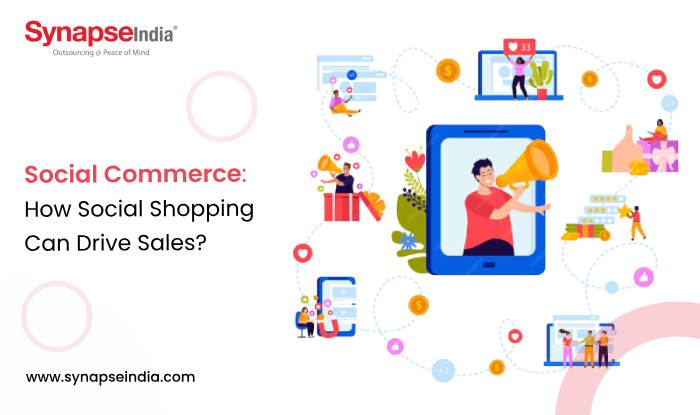 19 Apr 2024
19 Apr 2024“Social commerce is a process of buying and selling products or services directly through social media platforms. Users can browse shoppable posts, watch live-stream, shopping events, and see product recommendations from friends.”

The social media and online shopping industry has significantly changed the e-commerce sector, resulting in the emergence of social commerce. Through the merging of social networking and e-commerce platforms, social commerce allows users to find, examine, and buy things right from their social media feeds. Businesses have transformed customer engagement by leveraging social media to increase sales and cultivate brand loyalty. With the help of social commerce platforms like Facebook Marketplace, Instagram's shoppable photos, and TikTok's "Shop Now" feature, marketers can engage with customers in a more personalized and dynamic way than ever before. Businesses need to accept social commerce as an essential element as social media continues to have a significant impact on customer behavior.

Users can find, explore, and buy things through social commerce without ever leaving their preferred social networks. It has a wide range of features and capabilities, such as influencer marketing, social shopping integrations, in-app checkout, and shoppable posts. With the help of these tools, marketers can present their goods to a highly interested audience, make transactions easy, and use social proof to increase conversion rates. With consumers spending so much time on social media in this digital age, social commerce is a logical progression of the e-commerce experience. By incorporating a smooth online purchasing process into social media marketing, companies can capitalize on the social aspect of virtual interactions, establish more meaningful relationships with clients, and eventually increase sales.
Social media networks are integrated with product search, browsing, and purchasing to provide a smooth shopping experience. Customers will find this shortened process more convenient and frictionless, which will increase their pleasure.
Social media platforms allow businesses to reach a larger audience and boost brand awareness. Brands may promote their products to millions of consumers through shoppable posts, sponsored content, and influencer partnerships, increasing brand exposure and drawing in new clients.
Social media networks gather a lot of information about the tastes, pursuits, and actions of their users. By using this data to create more personalized and targeted shopping experiences, advertising and product recommendations will be more relevant, and conversion rates will rise.
User-generated content is a major factor in influencing consumer decisions when it comes to ratings, reviews, and recommendations. By enabling users to share their thoughts and purchasing experiences, social commerce platforms leverage the power of social proof to increase brand reputation and trust.
Social commerce facilitates instantaneous communication, feedback, and support between brands and consumers by fostering direct involvement. This participatory strategy promotes repeat business, loyalty, and stronger customer relationships.
Social commerce has a lot to offer companies hoping to increase sales by making use of social media's widespread appeal. In an online marketplace where competition is fierce, firms may boost sales, raise brand awareness, and improve customer engagement by using social media channels to make shopping experiences easier.

Social shopping platforms offer users a dynamic environment in which to learn about new brands and goods. Users are exposed to a wide choice of products that match their interests and preferences.
Social shopping solutions allow users to browse and buy things without ever leaving the platform by integrating e-commerce features directly into social media channels. The frictionless shopping experience lowers barriers to buying, facilitating users' transition from discovery to purchase.
Using the influence of social proof, social shopping helps consumers make judgments about what to buy. Product reviews, ratings, and recommendations are examples of user-generated material that aids in establishing the legitimacy and trustworthiness of companies and goods.
Social shopping systems provide users with interesting and captivating content formats that pique their interest and motivate them to delve deeper into the products. Live shopping events, interactive surveys, and product demos are examples of features that make shopping more engaging for users and, eventually, improve sales.
Social shopping systems use user information and behavioral insights to provide customized product suggestions and targeted advertising. Brands can adjust their marketing messaging to resonate with particular target segments and increase conversion and sales by analyzing user preferences, interests, and historical purchase behavior.
By offering targeted advertising, using social proof and recommendations, fostering compelling purchasing experiences, and seamlessly integrating e-commerce capabilities into social networks, social shopping enables social media to promote sales. Brands can increase revenue and leverage the growing impact of social media in the customer purchasing process by adopting social shopping trends and methods.


